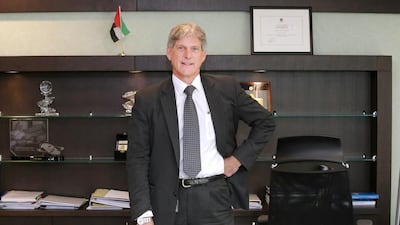When Patrick Allman Ward decided last year to give up the security of a 30-year career with the oil major Shell for the chief executive's job at relative minnow Dana Gas, the Sharjah-based energy company, the lure was all about potential.
“It is a great growth story. There are clearly challenges in the short to medium terms, but we sit on an attractive portfolio in Egypt and Kurdistan, and for a company of our size, the growth potential is tremendous,” says Mr Allman Ward.
Since his appointment, he has been guiding the company, which listed on the Abu Dhabi Securities Exchange in 2005, through a series of challenges in its main markets. It is too early to say that all ahead will be plain sailing, but it looks as though there may be some light at the end of the tunnel.
Operating profits for 2013 were ahead thanks to higher production in Egypt and higher fuel sales in the Kurdish of Iraq, but the company’s main challenges continued to be how to get money out of those two countries, both of which — for different reasons — have been unable to pay Dana Gas in full.
Add in a long-running dispute with Iran over stalled gas supplies, and that means much of Mr Allman Ward's thoughts are on legal disputes, contract negotiations and arbitration talks, as much as the nitty gritty of energy production.
The most intractable challenge appears to be the situation with Iran. Dana came into being nine years ago to process Iranian gas supplies, but — for what Mr Allman Ward calls “a variety of reasons both technical and political within Iran” — those supplies never materialised.
Processing capacity in the Arabian Gulf and the UAE is completed and available to receive the gas supplies, he says. But he declines to give an estimate as to when they might be forthcoming. The whole delicate process has been further clouded by the complexities of Iran’s international situation in the light of US-led sanctions.
The next challenge takes in the minefield of Iraqi business politics. In 2007, Dana Gas pulled off what looked at the time like something of a coup by clinching a deal to exploit substantial energy reserves in booming Kurdish Iraq.
“We always intended to enter Kurdistan on a long-term basis to fully develop the fields potential. We are very proud of our achievements there. We have made investments of over $1 billion since 2008, representing the single largest investment by the petroleum sector in the region,” says Mr Allman Ward.
The company helped to build production facilities and a 180-kilometre pipeline to bring gas to two power stations that supply most of the region’s electricity needs.
Problems arose, however, when it became time for the company — via its 40 per cent stake in the company developing the resources, Pearl Petroleum — to receive payment for its efforts. “While we have received some money it is not the full amount we believe we are entitled to under the terms of our contract,” says Mr Allman Ward.
After four years of unsuccessful negotiation with the Kurdish authorities, last summer Dana Gas took the next steps in the dispute resolution process: mediation and arbitration under English law. “Obviously I can’t say very much about the details of the process due to legal constraints. However, we continue to want to reach an amicable settlement with the Kurdish ministry of natural resources that will protect the investors’ rights whilst recognising the legitimate needs and expectations of the people of Iraq and the region of Kurdistan,” Mr Allman Ward says diplomatically.
There have been suggestions in the energy industry that Dana Gas might be bought out of its Kurdish business by a bigger player in the energy sector, but no such offer has yet surfaced.
In Egypt, “there has been some better news at the end of last year,” he says. In the wake of Arab Spring, all players in the energy sector there have had difficulties getting payment from cash-strapped Egyptian authorities.
Last December, Dana Gas received $53 million from a government scheme to clear the backlog to foreign investors, bringing the total collections for the year to $134m. This was less than the value of invoices for the year, and the company is still owed $274m in receivables from Egypt.
“The government has always shown a willingness to respect the contracts and pay what they owe, but we also understand that the political and economic situation in Egypt is challenging. Discussions are cordial and positive and there is a recognition that we need to create a win-win solution that will allow Dana Gas to get paid for its production and to recover the outstanding receivables over an acceptable time frame,” Mr Allman Ward says.
Other facilities in Egypt show “considerable growth potential”, he adds.
Elsewhere, things are also looking up. The relatively small Zora gas project in the UAE will produce its first gas next year, he hopes.
Immediate financial difficulties were resolved last year with a deal with bondholders for the successful rollover of a sukuk. Dana Gas now has a five-year $850m sukuk obligation, half of which is convertible into company shares.
“With the rise in the share price we have received some requests for conversion of these convertible bonds to shares, which will of course help to reduce our debt burden,” he says.
fkane@thenational.ae
Follow us on Twitter @Ind_Insights

